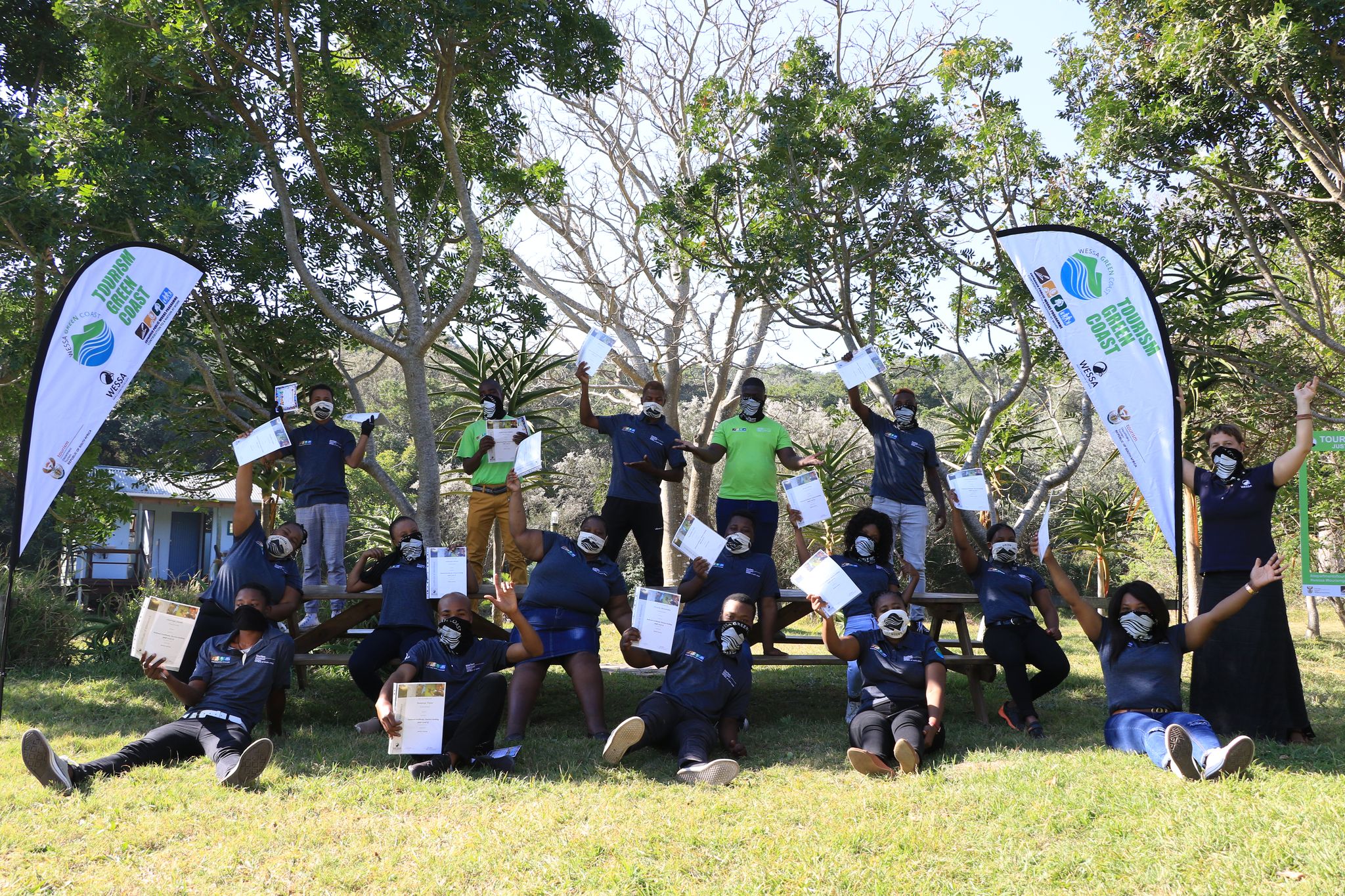
Jul 29, 2020 | Archives
Tourism Green Coast Youth Graduate into the Tourism Economy Four successive graduation ceremonies were held on the Wild Coast, Eastern Cape between the 15th and 24th July 2020, during which 118 youth from the Eastern Cape graduated from the Tourism Green Coast (TGC) Learnership programme. This youth development programme is funded via the Expanded Public
Works Programme (EPWP) by the Department of Tourism (DT) and implemented by the Wildlife and Environment Society of South Africa (WESSA). Tourism Green Coast is a youth learnership and skills-training programme which has been implemented in 21 Wild Coast communities in the Eastern Cape over the past two years. The TGC Learnership is a component of the Department of Tourism ‘Working for Tourism’ programmes.
Tourism Green Coast created 120 learnership opportunities in the environmental and sustainable tourism sectors for unemployed, previously disadvantaged youth between the ages of 18 and 35 living in Wild Coast communities. The Green Coast stewards have been hosted by a range of tourism businesses and organisations during the 2 year programme. This enabled them to apply their newly acquired knowledge and skills in the workplace, while being mentored by experienced industry professionals. The comprehensive training programme includes the accredited Tourism Guiding qualification as well as practical modules covering ecological monitoring, environmental education, child protection in the travel and tourism industry, entrepreneurship development and professional development. The programme is designed to increase the employability of youth wishing to enter the tourism economy and to stimulate the development of youth owned community-based tourism enterprises at Green Coast pilot sites. Together with our Green Coast Stewards, it is WESSA’s hope that the outcomes of this programme will have positive and far reaching impacts, despite current challenges facing the tourism sector due to the COVID-19 pandemic.
The programme commenced in May 2018 and 118 participants have now graduated after 2 years of being placed with a local tourism host organisation gaining marketable skills and work experience. Hosts included: Imonti Tours, Lucolo Palace, Areena Riverside Resort, Buccaneers Lodge and Backpackers, Emerald Vale Brewery, Haga Haga Hotel, Great Kei Local Municipality, Morgan Bay Hotel, Mitford Hotel, Yellowwood Forest, Kei Mouth Guesthouse, Kei Mouth Golf Course, Neptune’s Cove, Kei Mouth Revival, Trennerys Hotel, Mazeppa Bay Hotel, Nqabara Eco-Lodge, Dwesa Reserve, Bulungula Lodge, Wild Lubanzi, Hole in the Wall Hotel, White Clay Resort, Coffee Shack Backpackers, Friends Backpackers, Coram Deo, Ocean View Hotel, Mdumbi Backpackers, Freedom O Clock, Hluleka Reserve, Silaka Reserve, Port St John’s Tourism Info Centre, Pholela Lodge, Spotted Grunter, Amapondo Backpackers, Bamba Lodge, Outspan Inn and Mbotyi River Lodge.
Over the past 2 years of the TGC learnership, participants and are now proud recipients of their graduation certificates of competency. With the high youth unemployment rate in South Africa, which is escalating as a result of the impact of the COVID-19 pandemic, and limited access to skills training, these youth are poised and ready to contribute significantly to the reopening and rebuilding of the Tourism sector in South Africa. WESSA is proud to implement this highly impactful youth development programme together with our stakeholders, DT, municipalities, and our partnering host institutions. This is a programme which supports the Operation Phakisa Coastal and Marine Tourism initiative which together with the Tourism Blue Flag project has created opportunities for 420 learners since 2016 and is deeply aligned towards sustainable development and upliftment of communities.
For more information please contact:
TGC Project Manager, Kerry Mclean: Email: kerry.mclean@wessa.co.za : 078 300 3012
WESSA Group HR, Marketing and Communications Manager: sarah@wessa.co.za : 076 213 9873
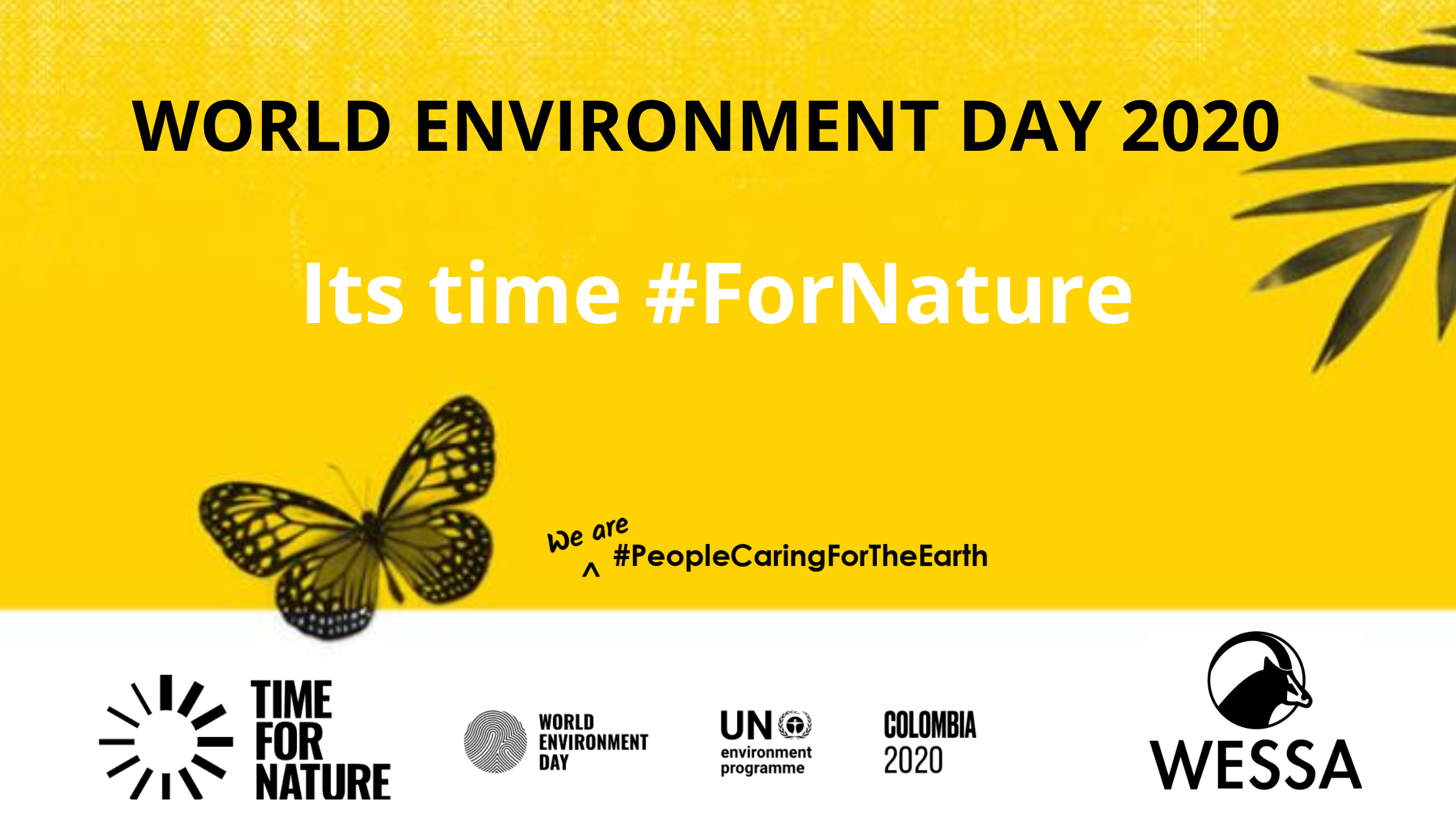
May 28, 2020 | Archives
Friday 5th of June marks World Environment Day 2020 which will be celebrated with under the theme Biodiversity #ForNature. The Wildlife and Environment Society of South Africa (WESSA) in partnership with United Nations Environment Programme (UNEP SA) will unleash the opportunities technology brings and mobilise youth to engage in a series of activities to enhance their understanding on the importance of nature. Only by knowing nature can we sustainably harness its benefits and preserve diversity of life on Earth. Restoring nature is critical for reversing the loss of biodiversity and sustaining a healthy planet. This will only be possible when we start to appreciate how crucial nature is for our own existence and quality of life. In the words of David Attenborough, “Never has it been more important to understand how the natural world works and how to help it.” This special day allows us to reflect on our dependence on nature — the foods we eat, the air we breathe, the water we drink and the climate that makes our planet habitable. Yet, these are exceptional times in which nature is sending us a message. Nature is showing that we as humanity cannot continue as before. It is time to wake up. To take notice. To reimagine our relationship with nature. It is time to raise our voices to tell the world that we need action now. This World Environment Day, it is time for nature.
WESSA in partnership with UNEP is raising a call to action for youth to engage in creative activities that capture their appreciation of nature, such as writing of poetry, prose, and articles, making videos, and/or taking photos. Youth stand a chance to win spot prices sponsored by supporting partners including the Department of Fisheries, Forestry and Environment and The Western Cape Government for Environment and Development Planning.
Youth are invited to step forward and speak out by recording a 60 second video articulating how they perceive nature and what nature means to them, participants can tag the campaign by using the following handles and hashtags; @WESSA_ZA @UNEP_Africa @UNEP @UNSA #ForNature #PeopleCaringForTheEarth #Worldenvironmentday WESSA in partnership with UNEP SA will host a webinar on the 5th of June in commemoration of WED 2020 and invites youth from all spheres to participate in a robust dialogue on the importance of Nature and the impact of the Covid-19 pandemic on our planet. Members of the public are encouraged to follow the social media pages of WESSA and the United Nations to receive more detailed information on how participate in this year’s World Environment Day activities.
The Sustainable Seas Trust is registered as a charitable, non-profit, public benefit institution.
Trust Registration: IT 2203/ 2006 South Africa | NPO Number: 078-120-NPO | PBO Number: 930022444
SOURCES:
https://www.worldenvironmentday.global
Contacts for interviews:
Natania Botha | WESSA Head of Membership | 072 632 8593 | natania.botha@wessa.co.za
Sarah Alcock | WESSA Group HR and Communications Manager | 076 213 9873 |
sarah@wessa.co.za
Cecilia Kinuthia Njenga| UNEP Head Regional Coordinator | 073 180 8730
|cecilia.njenga@un.org
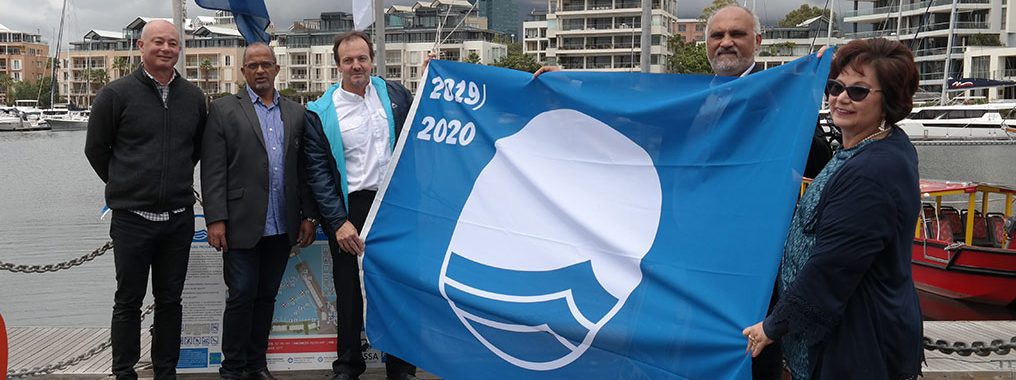
Oct 25, 2019 | Archives
64 Blue Flags will be proudly flown at 45 beaches, 9 marinas and by 10 sustainable tourism boats around South Africa over the forthcoming 2019/20 South African Blue Flag season. The season officially opens on the 1st of November 2019. This was announced at the National WESSA Blue Flag launch hosted by the V & A Waterfront in Cape Town on the 23rd October 2019.
The Western Cape has achieved the highest number of Blue Flag sites, with 33 beaches, 10 boats and seven of the nine Blue Flag marinas. The Eastern Cape has been awarded two Blue Flag Marina sites, as well as six beaches. Kwa-Zulu Natal has been awarded six Blue Flag beaches.
The Blue Flag programme also allows for potential Blue Flag sites to participate in the Pilot Programme. This year will see 35 beaches across our three coastal provinces on this development phase of the programme. WESSA will work with beach managers from these Pilot beaches, towards the longer-term goal of achieving full Blue Flag status. Part of this support includes the provision of Tourism Beach Stewards to these beaches, over the busiest holiday periods.
In her opening address, Mayoral Committee Member for Spatial Planning and Environment, Ms Marian Nieuwoudt said, “Blue Flag offers the City a management tool for acceptable living” and she mentioned that “We need to educate to change behavior”
Speaking at the event, South African endurance swimmer and founder of Breathe Conservation, Sarah Ferguson thanked WESSA for the work the organisation is doing through the Blue Flag programme and she emphasised that “together we can make a change and achieve great things, if we all find our passion and follow that and in the process think about the environment”
An impressive 40% of the Blue Flag beach sites have been on the programme for 10 or more consecutive years, while 7 of those sites have been on for 15 or more consecutive years. This season also sees the addition of four brand new sites to the programme. WESSA is proud to be the national implementing partner for Blue Flag in South Africa since 2001.
View the full list of 2019/20 Blue Flag Beaches, Boats and Marina’s
Ends.
INTERVIEWS:
Broadcasters please note that the WESSA CEO Dr Thommie Burger, and Vincent Shacks GM of Sustainable Tourism are available for radio and television interviews.
Links to images and captions:
Image 1 Sarah Ferguson and WESSA CEO Dr Thommie Burger presenting Marian Nieuwoudt, Councillor City of Cape Town, certificates for 10 Blue Flag full status and 1 pilot beach
Image 2 Sarah Ferguson and WESSA CEO Dr Thommie Burger presenting Carel Venter and Cliffie Beyman, from Mossel Bay Municipality, certificates for 5 Blue Flag full status beaches
Image 3 Sarah Ferguson and WESSA CEO Dr Thommie Burger presenting Nosicelo Xhasa, from Ndlambe Municipality, certificates for 2 Blue Flag full status and 1 pilot beach
Image 4 Sarah Ferguson and WESSA CEO Dr Thommie Burger presenting Nombuso Dube, from Ethekwini Municipality, certificates for 1 Blue Flag full status and 11 pilot beaches
Image 5 Sarah Ferguson and WESSA CEO Dr Thommie Burger presenting Andre Blaine, Louis Souls and Joshio Fisher, from V & A Waterfront, certificates for Blue Flag full status Marina
Image 6 Sarah Ferguson and WESSA CEO Dr Thommie Burger presenting Francis Saul and Mariette Hopley, from White Shark Ventures, certificates for full status boat
Image 7 Official Flag Raising done by WESSA CEO Dr Thommie Burger and Joshio Fisher, Louis Souls Thommie and Andre Blaine from V & A Waterfront and Marian Nieuwoudt from City of Cape Town
About WESSA Blue Flag:
The WESSA Blue Flag Programme, now in its 19th year, is focused on the conservation of marine and coastal habitats, and is designed to raise environmental education and awareness, and increase sound environmental practices among tourists, local populations and beach management bodies.
To achieve Blue Flag status, as many as 33 different criteria spanning over four themes of coastal management must be met and maintained: These are water quality, environmental education and information, environmental management, and safety and services. Each Blue Flag site is compelled to conduct several environmental education activities during the year, and to practise effective and efficient conservation management.
In South Africa, the Blue Flag programme is managed by WESSA and participating coastal municipalities. In the Southern Hemisphere, the Blue Flag season runs from 1 November to 31 October each year. Beaches are required to apply for Blue Flag status each year and the Blue Flag standards are only enforced at the beaches over the participating beach’s stated season, which varies from just two months of the year to the full 12 months.
The WESSA Blue Flag Programme is operated under the auspices of the Foundation for Environmental Education and is headquartered in Copenhagen, Denmark. The baseline criteria are set by the international coordinators of the Blue Flag campaign in Europe, the FEE (Foundation for Environmental Education). Through close collaboration with their members on all issues, the Foundation for Environmental Education works to ensure the programme’s expansion, and that the unrivalled standards of the Blue Flag are maintained internationally. The detailed criteria and award process is available on Blue Flag’s international website www.blueflag.global
About WESSA:
WESSA is a 93-year-old youthful and vibrant organisation with a rich history in South African conservation and environmental education. WESSA researches, develops and implements focused accredited and non-accredited environmental, ecotourism, education and youth development programmes throughout South Africa. We are the sole and proud implementor of all the international Foundation for Environmental Education (FEE) programmes in South Africa, as well as an implementor of choice for various youth programmes on behalf of Government and the private sector. Our youth education programmes under the banners of Eco-Schools, Learning about Forests, Young Reporters for the Environment and Youth Entrepreneurship, together with our five outdoor education centres, make a critical contribution to youth development. We are developing and giving hands on work experience to 800 unemployed youth through our Blue Flag, Green Coast and other Youth Programmes. We have a volunteer membership footprint throughout the country, with passionate members ensuring that local conservation and environmental issues are addressed. We are ‘People Caring for the Earth’ and we invite you to join us in our quest to become champions of the environment and achieving a more sustainable South Africa for all. For more information visit www.wessa.org.za
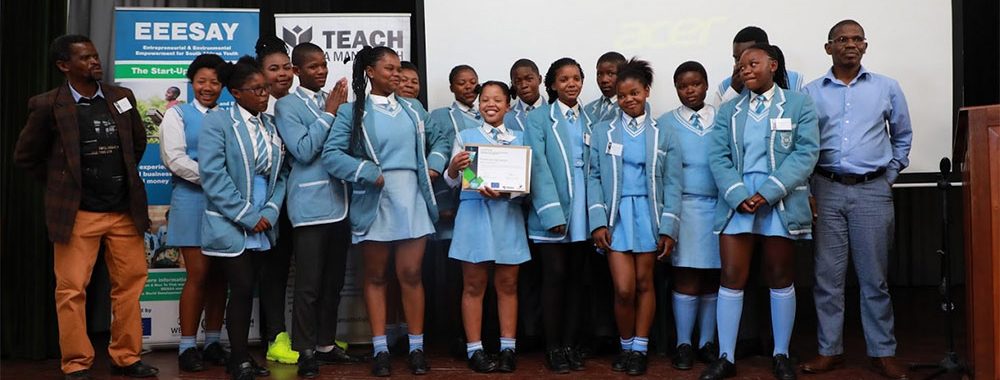
Oct 16, 2019 | Archives
An innovative high school project, EEESAY (Entrepreneurial & Environmental Empowerment for South African Youth), led by Teach A Man To Fish (TAMTF) in partnership with WESSA (Wildlife & Environment Society of South Africa) provides a pathway to youth employment and poverty reduction through learner-led school-businesses in two provinces of South Africa.
For the last three years the EEESAY Programme has been an outstanding success. It has provided step-by-step experiential learning to learners where they have identified business opportunities, applied sound business planning, and implemented robust business plans to generate profit. The businesses have been a platform for enabling learners to develop and improve the essential skills they need to flourish in the world of work and further study.
In the past week their efforts have been rewarded and recognised at the final annual celebration events in the Eastern Cape and Kwa Zulu Natal, where they showcased their businesses, shared their experiences with each other and expressed their dreams for a sustainable future. The catering and refreshments at these inspirational events were provided by learner-led enterprises, as has happened at most of the project workshops, too.
One of the most crucial skills that learners gain is the capacity to, and application of, iteration. The year-by-year cyclical learning and process of assessing the business progress, reviewing, ideating, and running, prepares young people for the reality of the world of work in their futures. Schools can invest the profits to develop both school and school business. At the same time, it is a great opportunity and platform for teachers to continue their own professional development.
EEESAY empowers South African youth to carve a sustainable future for themselves through practical business experience and exposure to environmentally-responsible entrepreneurship. The learner-led school businesses awaken learner potential, challenge their mindsets and stimulate an environment and aspiration for sustainable economic development that brings benefit to their community and environment. EEESAY fosters an environment where informal sector opportunities grow into successful business ventures. This combats the extremely high unemployment rate among South Africa youth that reached 55.2% in 2019 Q1.
The project was made possible through funding provided by the European Union Delegation to South Africa and private foundations. EEESAY gave 4000 learners from 35 schools (in the Amajuba and Uthukela districts in KwaZulu-Natal and Amathole and Chris Hani districts in the Eastern Cape provinces) an opportunity to gain practical business skills by setting up and running an educational and environmentally-sustainable enterprise at their school over a period of three years.
Ends.
AWARDS AND FULL CITATIONS:
EEESAY Award Name
Presented to
BEST BUSINESS PLAN is awarded to
KZN: Thembela High School in recognition of their thorough and well thought out business plan for their business.
https://drive.google.com/file/d/1p_miIZa497bahBzOVBc4Ews9FBbbkGPE/view?usp=sharing
EC: Joe Slovo High School in recognition of their thorough and well thought out business plan for their Tuck Shop business. Joe Slovo joined EEESAY only in 2019 and have made great strides this year to set up and run their tuck shop. They hit the ground running, by organising a fun run which generated R3017 in start-up capital to launch their business. https://drive.google.com/file/d/1oXVjIRC9mh_Xu7NMVZXHlBRKvnmT_m2S/view?usp=sharing
BEST ENVIRONMENTALLY SUSTAINABLE SCHOOL BUSINESS is awarded to Cathcart High School, EC, for the second time, in recognition of their continued outstanding efforts in environmental sustainability for creating eco-bricks for use in their school business.
https://drive.google.com/file/d/1nhb1YBJbGPGf5nFUAFIAIhMqxYm_A6Ex/view?usp=sharing
RUNNER UP IN THE ENVIRONMENTALLY SUSTAINABLE SCHOOL BUSINESS category is awarded to
KZN: Endakane High School for their persistence in finding good environmental solutions.
https://drive.google.com/file/d/1piqhkNgqnKHJMBac5WmLHOIs2zXwT3dv/view?usp=sharing
EC: Vuselela High School, EC, who started a food garden and later identified and set up a piggery. Learners realised that waste from their school business could be used to feed pigs, and the manure from their piggery could be used in their food garden as fertiliser creating a closed loop.
https://drive.google.com/file/d/1m36FEcO43CG12BdoXUZcpOKbV7aYRWSn/view?usp=sharing
BEST OVERALL BUSINESS 2017-2019 goes to
KZN: Amazulu High School for their continued and sustained efforts with their business.
https://drive.google.com/file/d/1pkz_yOZy6-F_9vukr2D8kSA5Sis_cQaZ/view?usp=sharing
EC: Byletts High School for their continued and sustained efforts with their catering tuck shop business. Byletts catering business has catered for many EEESAY events over the years. https://drive.google.com/file/d/1mQlpdwEqhMu2iu746ir4I5Vsc_6UNARy/view?usp=sharing
RUNNER UP OVERALL BUSINESS goes to
KZN: Amahlubi High School https://drive.google.com/file/d/1ppnpYVCbUgCjewg0xflmIXu0tnDeJmL4/view?usp=sharing
EC: WB Rubusana High School https://drive.google.com/file/d/1mPIu06Y3kuqBZhEr0RYL-VH2UKdXgoMG/view?usp=sharing
BEST ANNUAL REPORT POSTER is awarded to
KZN: Phendukani High School for their reflective thinking and ability to grow and develop their business over the year. https://drive.google.com/file/d/1pqUO5MplLGlVzdS_lytmrbaz-YQKVPQY/view?usp=sharing
EC: Phakamani High School for their reflective thinking and ability to grow and develop their Tuck Shop business over the year. https://drive.google.com/file/d/1mV9RSJXJxkxJD0nAsChZyD-kQ8ue_9bq/view?usp=sharing
IN RECOGNITION OF LEARNERS’ DRIVE AND DETERMINATION TO SUCCEED three schools in each province were celebrated; these schools have faced challenges and consistently worked through to find solutions and better ways of working.
KZN: DNC Combined School, Mana High School and Sesiyabonga High School.
https://drive.google.com/file/d/1mV9RSJXJxkxJD0nAsChZyD-kQ8ue_9bq/view?usp=sharing
https://drive.google.com/file/d/1prJAA7sthjJgBBymr4Z-1Jput3Yo9LzL/view?usp=sharing
https://drive.google.com/file/d/1pvdgfR8XJmXi6CA9JGwL0T45sH7ZylMB/view?usp=sharing
EC: Nompumelelo High School, Ncedolwethu Senior secondary and Bulelani High School.
https://drive.google.com/file/d/1mUBzGqX5Mn2KfhtIUPGnL2QG6l7XDP15/view?usp=sharing
NOTES TO EDITORS:
Interviews:
Broadcasters please note that TAMTF Programme Manager, Susannah Morcowitz and WESSA Project Manager, Sue Spies, and all winners, are available for radio and television interviews.
About TAMTF:
Teach A Man To Fish is guided by a simple, all-encompassing mission: to empower young people with the skills they need to succeed, in school, work, and life. We focus on developing and emerging countries. Globally there are more than 74 million young people unemployed (International Labour Organisation 2018). We believe that practical entrepreneurship education is key to tackling youth unemployment and poverty worldwide, and we know this turns job seekers into job creators.
We work with schools around the world. We equip teachers to help young people gain business and life skills through our practical School-Business Model. In the long-term, these skills will help our alumni secure a job or set up their own business after leaving school. Since 2006, we’ve created over 250,000 student entrepreneurs and 15,000 enterprising teachers through our global programmes.
Our philosophy is: give a man a fish and he’ll eat for a day, teach a man to fish and he’ll eat for a lifetime.
We are a small organisation with big reach – since 2006 we have brought the pioneering school business model to more than 100 countries, and have staff based in Uganda, Rwanda, Nicaragua, Honduras, Guatemala and the UK.
www.schoolenterprisechallenge.org
www.teachamantofish.org.uk
About WESSA:
WESSA is a 93-year-old youthful and vibrant organisation with a rich history in South African conservation and environmental education. WESSA researches, develops and implements focused, accredited and non-accredited environmental, ecotourism, education and youth development programmes throughout South Africa. We are the sole and proud implementor of all the international Foundation for Environmental Education (FEE) programmes in South Africa, as well as an implementor of choice for various youth programmes on behalf of Government and the private sector. Our youth education programmes under the banners of Eco-Schools, Learning about Forests, Young Reporters for the Environment and Youth Entrepreneurship, together with our five outdoor education centres, make a critical contribution to youth development. We are developing and giving hands-on work experience to 800 unemployed youth through our Blue Flag, Green Coast and other Youth Programmes. We have a volunteer membership footprint throughout the country, with passionate members ensuring that local conservation and environmental issues are addressed. We are ‘People Caring for the Earth’ and we invite you to join us in our quest to become champions of the environment and achieving a more sustainable South Africa for all.
www.wessa.org.za
For more information contact:
Susannah Morcowitz, Teach A Man to Fish South Africa Country Manager
Email: susannah@teachamantofish.org.uk or cell 079 859 6870
Sue Spies, WESSA EEESAY Project Manager
Email: sue.spies@wessa.co.za or cell 079 504 4296
________________________________
Download Word Document Version

Sep 15, 2019 | Archives
WESSA (the Wildlife and Environment Society of South Africa) paid tribute to a wide range of outstanding environmental achievements with the presentation of the organisation’s National Annual Awards. These Awards were presented at the organisation’s 93rd AGM, which was hosted by WESSA’s Northern Areas Region in Muldersdrift, Gauteng on Saturday 14 September 2019.
The WESSA Awards, which have been presented since 1974, enable WESSA to recognise and honour those who have made a significant contribution to the conservation or environmental education sector in South Africa over the past year in an exceptional and sustained manner.
The WESSA Individual Award was presented to Dr Louis van Schalkwyk, the WESSA Group Award recipient was presented to the documentary STROOP – Journey into the rhino horn war, the WESSA Award for Corporates was awarded to Vergelegen Wine Estate, and the WESSA Youth Award was presented to Ziphezinhle Langa
WESSA also paid tribute to Robert Cross who was awarded the WESSA Gold Award for his extraordinary contribution to environmental education for over 50 years, and Mdiceni Gumede who was awarded a Lifetime Achievement Award for his contributions to conservation.
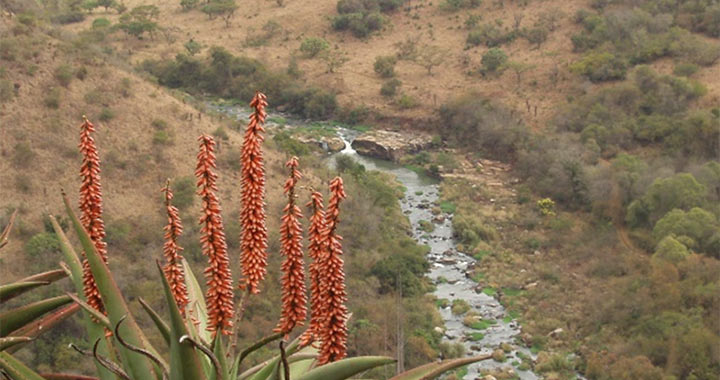
Jun 11, 2019 | Archives
After seven years of a long legislative process, we are pleased to inform you that uMngeni Valley has been proclaimed a Nature Reserve. The process was officially gazetted on the 16th May 2019. uMngeni Valley is a place of special value as it holds an important contribution to the aesthetics and sense of place of Howick, and it has significant value in terms of its habitat.
Due to the various altitudinal gradients of the area varies, there are a wide variety of habitat types. These include Midlands Mistbelt Grassland, KZN Hinterland Thornveld, Southern KZN Moist Grassland, forest patches, riverine thicket, sub-tropical thicket and thornveld savannah. uMngeni Valley forms part of the core area of the Greater uMngeni Biosphere Reserve initiative, incorporating the uMngeni and Karkloof River Catchments, from Midmar Dam to Nagle Dam. It also contributes to the hydrological functioning, ecosystem and biodiversity value of the uMngeni River Catchment, which is a critically important river system in KwaZulu-Natal.
There is also significant contribution to the economic sustainability of the region through its tourism activities. It is an important part of conservation within the landscape forming part of a mosaic of protected areas across the region. Together with the ecological and socio-economic value of uMngeni Valley, it also plays a significant role in the cultural and social value of the KZN Midlands. There are several graves and Iron Age sites within uMngeni Valley which are of cultural and historic importance.
The process of getting the Nature Reserve proclaimed as a protected area started in 2012. A major part of the process to achievet proclamation was the development of a Protected Areas Management System (PAMS) for uMngeni Valley. PAMS is a management system that is specifically aimed at managing protected areas effectively.
WESSA undertakes to implement PAMS in all its operations and activities within Umgeni Valley Nature Reserve. The many benefits to the proclamation will include a larger focus and protection from Ezemvelo KZN Wildlife, the Department of Environmental Affairs, and other government entities for an increased protection of this ecosystem. There will be more attention on alien eradication vegetation programmes, water quality projects, and species protection programmes.
In addition, WESSA aims for this exciting new development to revive the uMngeni Biosphere Reserve project which could attract more funding for conservation and biodiversity protection. WESSA will also look to developing their sustainable tourism programmes to attract more visitors to the reserve.
uMngeni Valley is a centre of excellence for conservation management and environmental education for WESSA. It is a significant achievement for all stakeholders that were involved. WESSA will ensure that uMngeni Valley will continue to be a destination for schools and families alike and will offer lifelong memories for generations to come.





